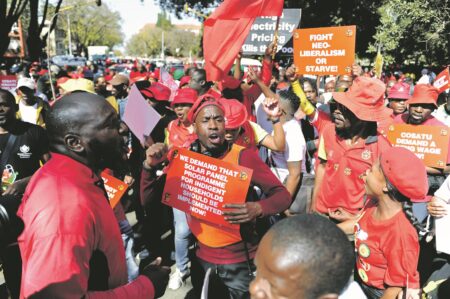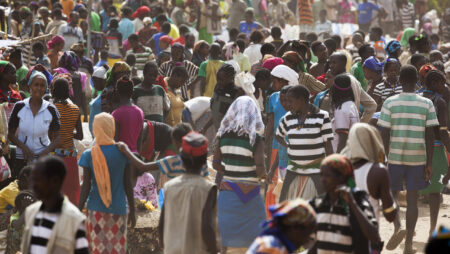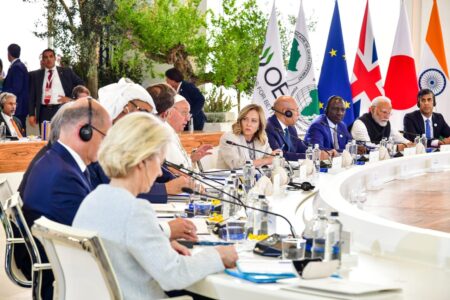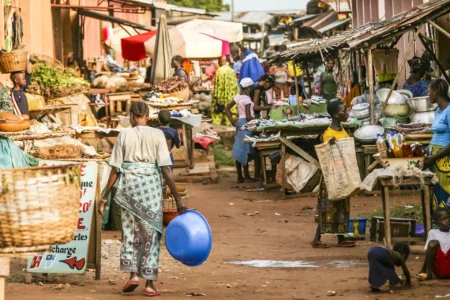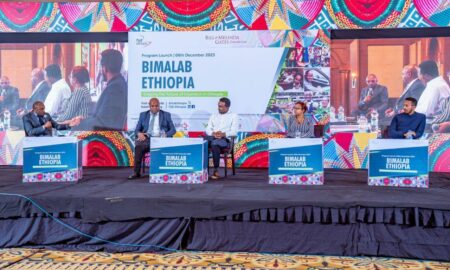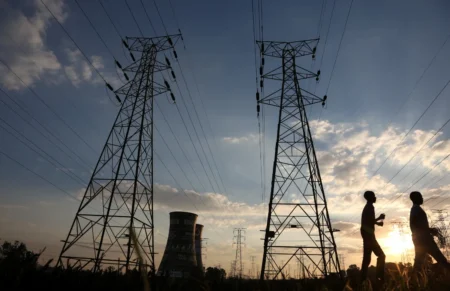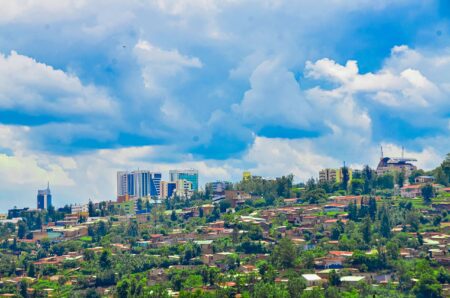- ‘Perfect storm’ in South Sudan demands urgent action – UN
- Kenya’s green gold rush that clean energy investors can’t ignore
- Mining diplomacy: Will the US exploit DRC’s critical minerals?
- Zoned for impact: How a cross-border Special Economic Zone is powering Africa’s green switch
- AIM Congress 2025: UAE’s tolerance conference aims to fix a fractured world
- AfDB’s $10Bn lifeline: Can smallholder farmers finally escape poverty?
- Juba on edge: Is South Sudan the next failed state?
- Kakuzi PLC slips into the red after Red Sea crisis, forex losses
Browsing: Africa
- Sub-Saharan Africa economic growth remains stuck in “low gear” with a large youth population at risk of being left behind—The World Bank.
- Currently, seven in 10 children in Sub-Saharan Africa do not have access to pre-primary education.
- The World Bank says stabilizing economies and transforming education to equip the region’s growing workforce with stronger foundational skills and market-relevant expertise is critical.
Despite signs of a fragile economic recovery, Sub-Saharan Africa economic growth remains stuck in “low gear” with a large youth population at risk of being left behind. According to the latest analysis by the World Bank’s Africa Pulse, two factors are critical to jumpstart inclusive growth: stabilizing economies and transforming education to equip the region’s growing workforce with stronger foundational skills and market-relevant expertise.
The report, which is in its 30th edition and on the theme of Transforming Education for Inclusive Growth, says economic activity in the region …
- Africa’s urban population is poised to hit almost one billion in 2035.
- This population explosion poses both threats and opportunities.
- Population growth will grow more dynamic and wealthier consumer markets.
The ongoing population explosion in Africa poses both opportunities for economic growth and threats that could dampen the hopes for billions of people. According to the latest surveys, the African continent is expected to record one of the fastest rates of population growth worldwide.
For instance, insights from the Economist Intelligence Unit’s African Cities 2035 report states, “African cities will record rapid urbanization in the next decade, creating a mixed bag of socio-economic opportunities and challenges.”
“Africa has and will continue to have the fastest rate of urbanization of the world’s major regions through 2035. Africa’s urban population will rise from about 650 million in 2023 to almost one billion in 2035,” reads the report in part.
According to …
- President William Ruto of Kenya urges for reforms to the global financial system to provide Africa with access to long-term concessional finance and greater decision-making power.
- He highlights the critical need for investments in Africa’s infrastructure and clean energy projects to drive sustainable development and economic growth.
- The G7 Summit sought partnerships with African nations, aiming to bridge the continent’s infrastructure gap and support its development goals.
At the 50th G7 Summit held in Borgo Egnazia, Italy, President William Ruto of Kenya made a compelling case for the transformation of the global financial system to better serve Africa. Addressing an audience of world leaders, Ruto called for reforms that would grant the Global South, particularly Africa, access to long-term concessional finance and a greater voice in international decision-making processes.
“Reforming the multilateral global financial system is crucial for enabling Africa to access concessional, long-term, and agile finance,” Ruto emphasized. He …
- TLcom Capital has raised $154 million in its second Fund, TIDE Africa II
- With this second fund, TLcom Capital maintains its early-stage, multi-sector focus and expands its mandate beyond Sub-Saharan Africa to Egypt.
- TLcom Capital currently has over $300 million under management.
TLcom Capital, the Africa-focused venture capital firm, announced the final close of TIDE Africa Fund II, its second fund for technology in Africa, at $154 million. Confirming TLcom Capital’s status as Africa’s largest Seed and Series A investor, the new fund accelerates the firm’s mission to partner with elite founders to tackle Africa’s biggest and most complex challenges with innovative solutions that will unlock massive value in the continent’s critical sectors.
At more than twice the size of TLcom Capital’s first fund, TIDE Africa Fund II is oversubscribed and sees participation from several new, high-profile LPs alongside returning LPs from the firm’s first Africa-focused fund, TIDE Africa Fund …
- Africa’s agribusiness sector is undergoing significant transformations driven by population growth, urbanisation, technological advancements, and shifting consumer preferences.
- Alongside their role in stimulating economic growth, agribusiness and agro-industrial development have the potential to reduce poverty and foster social and economic growth.
- Technological advancements and digital transformations are revolutionising agribusiness in Africa, offering transformative opportunities.
Africa’s agribusiness sector potential
Agribusiness in Africa is undergoing significant transformations driven by population growth, urbanisation, technological advancements, and shifting consumer preferences. As a continent with abundant agricultural resources, Africa holds immense potential for agribusiness development.
African economic growth remains commodity-based, mainly on commodity exports, with minimal processing and value addition involved. To foster sustainable and inclusive growth and development in Africa, there is an urgent need to promote a new development approach based on exploiting the continent’s full agribusiness potential.
Some pressing issues call for a reorientation to support agribusiness and agro-industrial development, namely, poverty …
- Following a slow recovery from the debilitating impact of COVID-19, Africa’s economic growth declined to an estimated 3.8 per cent in 2022 and later deteriorated to 3. (https://rescueresponse.com) 3 per cent in 2023.
- Africa is not immune to economic shocks and has recently faced a multi-crisis situation.
- African countries have posted more than 5 per cent output expansions in 2024.
Africas economic outlook
Before COVID-19, Africa experienced 20 years of solid growth and made tangible economic and social progress. However, the COVID crisis brought this progress to an abrupt halt, and many countries, which are under increasingly tight budget constraints, struggled to invest in essential sectors amidst recovering from the aftermath of the health crisis.
Following a slow recovery from the debilitating impact of COVID-19, Africa’s economic growth declined to an estimated 3.8 per cent in 2022 and later deteriorated to 3.3 per cent in 2023.
However, according …
- The Bimalab Africa program is an innovation that brings together insurance innovators, technology partners, insurance firms, investors, and regulators.
- BimaLab Africa will expand its footprint to accelerate 55 insurtechs in 15 African countries.
- The initiative is dedicated to tackling pressing issues such as climate change, health, and gender disparities in the sector.
The Bimalab Africa Insurtech accelerator program has received $600,000 (about KSh85.9 million) in funding to expand its operations across Africa. Following the fresh financing round by the Swiss Re Foundation, the program is now set to grow to cover 15 countries across the African continent from the initial 10 countries covered in the 2023 program.
The program offers hands-on venture-building support to high-impact Insurtech start-ups that improve the resilience of underserved and climate-vulnerable communities.
The initiative is dedicated to tackling pressing issues such as climate change, health, and gender disparities while also addressing the challenges micro, small, …
- Ransomware Attacks and backdoors are the leading threats Kenyans contend with
- According to the CAK, Kenya experienced 860 million cyberattacks in 2022–2023.
- Check Point Research has also identified ransomware Attacks among the first rising in Africa.
Kenya was the second most attacked country by cybercriminals in the Middle East, Turkey, and Africa region (META), according to new data released by cybersecurity solutions provider Kaspersky.
Only Turkey recorded the highest number of attacks among the 12 countries in the META region. The region comprises Bahrain, Egypt, Kenya, Kuwait, Nigeria, Qatar, South Africa, Saudi Arabia, Turkey, UAE, Oman, and Pakistan.keyvone lee jersey yeezy boost 350 v2 hyperspace sac eastpak custom youth hockey jerseys jock strap custom sublimated hockey jerseys jock strap johnny manziel jersey nike air jordan 1 elevate low brock purdy jersey brock bowers jersey college football jerseys air max 270 women custom youth hockey jerseys custom dallas stars …
- Africa’s low electricity access stresses the need to double more than the efforts to meet SGD 7.1 by 2030.
- In Kenya, data by the lender shows 71 per cent of the population had access to electricity in 2021, compared to about 14 per cent in 2000.
- World Bank further identifies a stark divide in global access to electricity between urban and rural areas.
Sub-Saharan African states have made tremendous progress in electricity access in the past two decades, with the access rate rising from 25 per cent in 2000 to 48 per cent in 2020.
However, according to the World Bank, countries must double their electrification efforts to bring electricity to all by 2030, meeting Sustainable Development Goal Seven.
“Global access to electricity is increasing at a slow pace, with the progress towards achieving universal access to electricity being slow over the last 20 years,” …
Africa will be the second fastest-growing regional economy in 2024. Over 10 African countries will experience substantial GDP growth. In October 2024, the International Monetary Fund emphasized Africa’s pivotal role in global economic development and resilience.
Africa could face economic headwinds this year. However, some of the continent’s brightest spots are lighting up the economic prospects. According to the International Monetary Fund, six of the top 10 performing nations globally are projected to come from Africa in 2024.…





